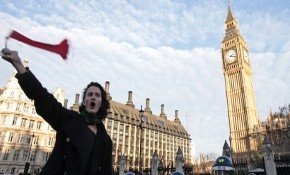Perhaps you picture fire extinguishers being thrown, or students hanging off the Cenotaph. Perhaps you think of today’s cabinet, having patiently networked through PPE and Bullingdon and Oxford, biding their time ready to special-advise their way into power.
Either way you’d be surprised if students had any serious or sustained contribution to make to the argument – that anyone in power took any notice of.
Nowadays, though, things have changed. In the days of the 99 per cent vs. the one per cent, rising inequality is between generations as well as between classes. Rather than simply getting angry, or quietly having fun, safe in the knowledge that a job will come their way, one in five students will now be unemployed straight after graduating. It’s a far cry from the heady days of the mid-20th century. So students quite rightly want a serious voice in the political debate. They – and the whole of society – need this inequality to change.
So students now do politics differently. Leading the change have been student think-tanks, starting in Cambridge in 2009 with the Wilberforce Society, and soon spreading across Britain. Some of the biggest are now in Warwick, Exeter, King’s College London and St. Andrews. They aren’t just talking-shops, or safe havens for the less socially-adjusted end of student social life to console itself in its isolation. More and more, these organisations have sustained political engagement too.
In the last year for example the Wilberforce Society has worked for the Tunisian National Assembly on their new constitution. They’ve worked for Shelter on homelessness in Cambridge, submitted to the Government’s review of same-sex marriage, and are working with YouGov looking at the influence of scientists on politics. On each of these questions, opinions vary sharply between the generations, whether politicians like it or not. Generation Y – those under 31 – have plenty to be vocal about. They are free to step outside the usual narrow policy debate, and look at institutions with a fresh eye.
Just last week, The Wilberforce Society pulled together some of the country’s best-known commentators at a conference to ask what the 21st-century university is for. Over thirty students used the event to launch their own research on the future of post-16 education, both academic and vocational.
At the Conference Lord Glasman – of ‘Blue Labour’ fame, and a close supporter of the society – praised their willingness ‘to think freely and creatively’. His new politics of the ‘Common Good’, which underpins so much of the Miliband-Cruddas ‘One Nation’ rhetoric, prioritises the voice of all parts of the community working together, students included.
Glasman believes today’s political leaders lack true strategy or vision. He says the ‘low grade rationalism’ dominating current politics can only be cured by a proper training in statesmanship. Traditional universities do none of this – they merely train activists who achieve very little, or they train functionaries who will tread the party line. Theorists like Peter Hall would say there’s not enough second-order policy debate over institutions. We need to fill the gap between ‘higher or lower’ technocratic tinkering, and unrealistic challenges to capitalism itself.
Students who learn to represent their generation’s interests whilst still studying might have some hope of providing true leadership in years to come. Critically, if they can learn to challenge their elders, whilst still engaging them on their terms, they will make their point and still be taken seriously.
How should Universities provide better leaders for the 21 century?
They have three main jobs:
1. Promote constructive student engagement with politicians.
This has to come from student unions, ultimately, and not just from student think tanks. Action by the NUS and university unions should focus on lobbying and policy work with NGOs, which needn’t pretend to be ‘value free’. Protests grab headlines – and of course serve a useful purpose – but are easily ignored.
2. Change their courses to reflect the 21st-century.
At the Wilberforce Society Conference Lord Rees, the Astronomer Royal and a former Professor of Cosmology at Cambridge, argued that traditional specialist university courses needed to broaden. There’s little incentive in the ‘market’ for Russell Group universities to do this – their brands are strong already. The momentum should come from students.
3. Keep themselves rooted in their community.
The politics of the common good asks that everyone learns their debt to their community. Student unions like Queen Mary University of London have already pioneered this through living wage campaigns. But there’s still work to be done in getting students to volunteer more, and help raise aspirations across the board.
Overall, we should all be optimistic about this newly-engaged future. The success of community organising shows how a new politics of the common good keeps us rooted and secure from the worst of globalisation, and helps people’s lives too. Witness London Citizens’ pioneering living wage campaign – helping lift thousands out of welfare – and the role of grassroots activism in Obama’s historic victory in 2008.
UK universities have an indispensable role in helping to lead the transition to this new politics. Both Blue Labour and Red Tories agree it is in everyone’s interest. So for all of us, it’s time to think again about student politics. No longer can it just be written off as angry protests – fees, debt and unemployment are too high for that. This time, the new generation will be heard.









